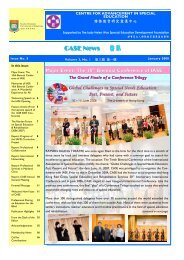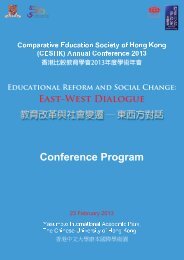C E R C u l a r - Faculty of Education - The University of Hong Kong
C E R C u l a r - Faculty of Education - The University of Hong Kong
C E R C u l a r - Faculty of Education - The University of Hong Kong
Create successful ePaper yourself
Turn your PDF publications into a flip-book with our unique Google optimized e-Paper software.
CERCular<br />
Vol.10, No.2, 2004<br />
10th Anniversary: Highlights from CERC’s first decade<br />
Methodology Workshop for Young PRC Scholars<br />
In January 2000, CERC organised a two-day workshop for a dozen young scholars from the Chinese mainland. <strong>The</strong> workshop was<br />
financed by the <strong>University</strong> <strong>of</strong> <strong>Hong</strong> <strong>Kong</strong>’s Area <strong>of</strong> Distinction seed funds, and was directed by Gui Qin. <strong>The</strong> workshop comprised<br />
two days <strong>of</strong> lectures and follow-up discussion given by Mark Bray, Neville Postlethwaite, Gui Qin and Zhang Weiyuan, and was<br />
conducted in Putonghua and English.<br />
<strong>The</strong> participants came from different regions <strong>of</strong> China, and the selection committee also paid attention to gender balance.<br />
All participants were in their 30s, and thus had commenced their careers but were still in an early stage with strong potential. <strong>The</strong><br />
majority had never before travelled out <strong>of</strong> mainland China. <strong>The</strong><br />
evaluation feedback was very positive. <strong>The</strong> participants were also<br />
sponsored to attend the annual conference <strong>of</strong> the Comparative<br />
<strong>Education</strong> Society <strong>of</strong> <strong>Hong</strong> <strong>Kong</strong>, which was hosted by CERC the<br />
day following the conclusion <strong>of</strong> the workshop.<br />
Gansu Basic <strong>Education</strong> Project<br />
In 2001, CERC hosted two visits by educators<br />
from Gansu Province. <strong>The</strong> first was a 10-day visit by 21<br />
administrators and educators. <strong>The</strong> second was a 7-day<br />
visit by 15 educators.<strong>The</strong>ir programmes were managed<br />
by Bob Adamson with the assistance <strong>of</strong> various<br />
colleagues, and particularly Sun Miantao, Judy Zhu and<br />
Emily Mang. <strong>The</strong> visits were part <strong>of</strong> the Gansu Basic <strong>Education</strong><br />
Project, which is funded by the UK Department for<br />
International Development and managed by Cambridge<br />
<strong>Education</strong> Consultants. <strong>The</strong> project aims to raise enrolment<br />
rates, especially <strong>of</strong> ethnic minorities, in four counties<br />
<strong>of</strong> the province. Particular focus is being placed on<br />
the education <strong>of</strong> girls, women teachers, student<br />
Back row: <strong>The</strong> young scholars<br />
Front row: (From left ) Gui Qin, Mark Bray,<br />
Neville Postlethwaite & Bob Adamson<br />
Review <strong>of</strong> Higher <strong>Education</strong> in Macau<br />
Mark Bray led a team comprising himself, Roy Butler, Philip<br />
Hui (HKIEd), Ora Kwo and Emily Mang in a review <strong>of</strong><br />
higher education in Macau. <strong>The</strong> work was conducted between July<br />
2000 and March 2001, and led to a 132-page report entitled Higher<br />
<strong>Education</strong> in Macau: Strategic Development in the New Era, which<br />
was <strong>of</strong>ficially launched in Macau on 7 December 2001. <strong>The</strong> report<br />
was published as a book with updated statistics and information,<br />
and with a slightly revised title, (see below).<br />
2002; 124pp.<br />
ISBN 962 8093 60 6<br />
HK$150 / US$24<br />
Higher <strong>Education</strong> in Macau:<br />
Growth and Strategic Development<br />
Mark Bray with Roy Butler, Philip Hui,<br />
Ora Kwo & Emily Mang<br />
Higher education in Macau has expanded dramatically<br />
in recent years. Before 1981, Macau had<br />
no higher education institutions; but two decades<br />
lat er it had 12. This book chronicles this growth,<br />
and analyses the wider environment within which<br />
the institutions operate. Discussion includes a focus<br />
on the implications <strong>of</strong> Macau’s small size; linkages<br />
with <strong>Hong</strong> <strong>Kong</strong>, mainland China and other<br />
parts <strong>of</strong> the world; the changing balances between<br />
public and private provision; and the significance<br />
<strong>of</strong> political transition.<br />
evaluation and school life through children’s eyes. (continued on the next page)<br />
11

















